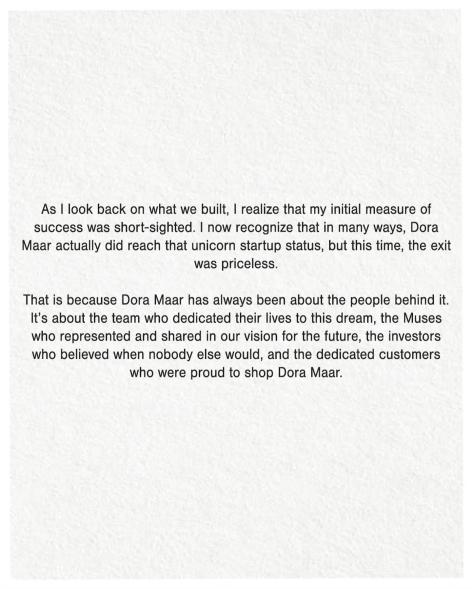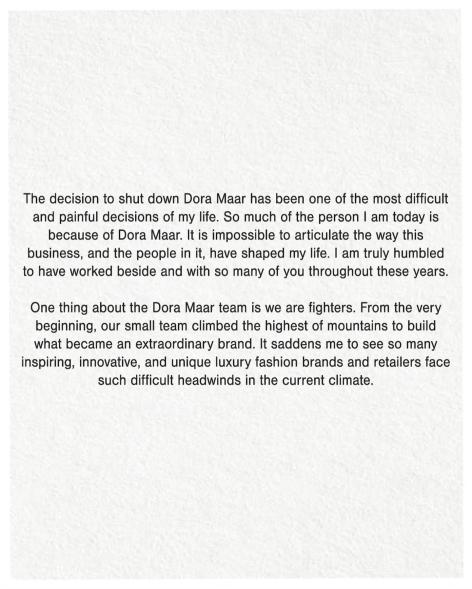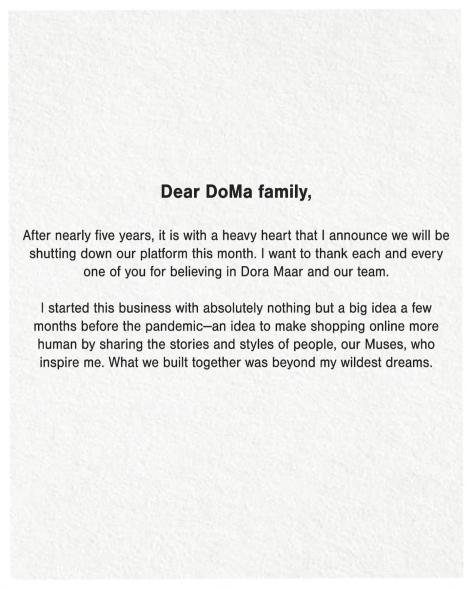Before deciding to sell her designer clothes, Monica Suk had barely heard of Dora Maar.
Now, she wishes she never had — after the trendy NYC-based online luxury consignment shop went out of business, leaving her high and dry.
The company and its founder and chief executive, Lauren Taylor Wilson, were once splashed across the pages of Vogue, Marie Claire, Women’s Wear Daily, Forbes and The Wall Street Journal.
Lilah Ramzi, an editor and fashion historian, and the style blogger Leandra Medine Cohen also helped promote the project, giving it additional heft — Rodarte and Markarian, who dressed Jill Biden for the 2021 inauguration, even teamed up with the trendy site to resell inventory.
“It looked legit, and it was cool,” Suk, a 36-year-old tech professional in Hong Kong, told The Post.
Wilson, 35, brought major cred to the project, having previously held impressive positions at luxury platform Moda Operandi and in marketing at Christie’s and Gucci before starting Dora Maar in 2019 to sell high-end fashion through community and storytelling and establish a provenance for each piece of clothing.
Unlike competing consignment operations like The RealReal, Vestiaire Collective, Poshmark or Rebag, Dora Maar, named for the Surrealist photographer and onetime lover of Picasso, elevated its consignors to rock star status.
The sellers, most of whom were micro-influencers Wilson called “muses,” were highlighted on the website and on social media in magazine-worthy photographs, typically wearing the clothes they were selling.
Many of them were stylists hawking their own services, and they welcomed the exposure and chance to promote their brands.
‘Heartbreaking and painful’
When Suk turned to the company to off-load her estimated $16,000 worth of designer wares last year, a direct conversation with Brian Solis, Dora Maar’s head of fashion, helped to put her at ease, as did emails with Solis and the team.
“They made it easy for me to sell my items,” she said — providing her with a DHL label and a set time to pick them up.
Suk signed a lengthy contract about a month after and shipped two boxes of clothing — including a black Gabriela Hearst cashmere and silk dress, a Bottega Veneta poplin top, a Celine sweater and a pair of Chanel rubber rain boots — to the company’s Brooklyn headquarters.
Suk waited for payment, but claimed none came.
At the end of July 2024, Suk received a mass email from Wilson informing her that as of early August, Dora Maar would cease business operations. The Post viewed the email in which Wilson wrote the decision was “incredibly heartbreaking and painful for all of us.”
The founder claimed the team took part-time pay cuts in the spring and she had “barely taken a paycheck for over a year.”
After an anticipated investment fell through over the summer, the shop had no choice but to shutter.
Wilson said in a message that she was proud of the team, the muses and the “relationships that were formed that became more than just a business, and more than a community,” she wrote. “It became a DoMa family.”
Wilson also acknowledged that it was her responsibility to try to make the muses “whole,” but she couldn’t guarantee that would happen. She asked sellers to let her know if they wanted their unsold items returned or if she should try to sell them with another resale platform.
The website is still live, but no products are available for sale.
Nonpayment
Suk, who still hadn’t received any commissions, sent Wilson an email on July 30 requesting payment for 22 items, which had sold for $3,626.65.
Wilson assured Suk a week later that her leftover merchandise would be shipped back.
“As for the commissions, we are working on this through the closure and will follow up in due course,” she wrote in an email seen by The Post.
Weeks later, Suk claimed she never received the money or the clothes. Worst, she claimed some of the prices on her pieces had been heavily discounted without her consent.
In September 2024, after multiple attempts at getting a response from Wilson on her outstanding payments and giving her a deadline for rectifying the situation, Suk posted a video online, alleging her items were “stolen,” and asked others to share their experiences.
She received comments from more than 40 women for an estimated $25,000 in total. Some claimed they were invited to invest in the company; others claimed they were recruited in the months or weeks before Dora Maar announced its closing.
Some sold clothing on behalf of their own clients, which meant they owed money elsewhere. One was told that a Dora Maar employee’s mother had purchased her handbag; another said her items were bought by an employee.
None of the women had been paid since April, they claimed — with insult added to injury as they watched Wilson post glamorous pictures from her European travels.
‘It was very alluring’
Kate Easton, an actress in New York, is also waiting to get paid for her items. Easton, who declined to give her age, was asked to pose for a spring campaign to promote Dora Maar.
“The mutually agreed-upon terms were that they would sell my luxury items and I would receive commission for each of my items sold,” said Easton, who also posted on Instagram about Dora Maar events and clothing.
Easton reached out many times over the next few months about the nonpayment and was eventually told that the company was shutting down and wouldn’t be able to pay her commission from sales — nor were they able to return her sold items.
“It’s disappointing and unfortunate that I was never paid for two of my luxury items that were sold on their site,” she said.
“‘Predatory’ — that’s the best word I can describe for what the experience was for me,” Clare Hardy, 39, said.
Hardy added that Wilson messaged her online and invited her to become a muse in March. Hardy, who works at a large tech conglomerate and runs a website called The Haute Lady, was just starting out in the luxury resale space and was flattered that someone of Wilson’s stature deemed her muse-worthy.
“I was blown away that a very small, brand-new creator like me would even get that type of attention,” Hardy said. “The thought was, ‘Oh, I was handpicked to be a muse.’ It was very alluring.”
She assembled about 15 items, shelled out roughly $2,000 on a photo shoot of her wearing them and sent everything from her home in Atlanta to New York.
“It’s like I was targeted because I was a new creator who didn’t know what the heck she was doing,” said Hardy, who has not been repaid the $4,000 she estimates she is owed. (She did receive her unsold clothes, minus an Hermès bracelet.)
‘Emotional betrayal’
Natalia Zemliakova, a stylist in New York who declined to give her age, was also “discovered” by Dora Maar on Instagram in late March. Like other women, she appreciated the company’s ethos.
“With The RealReal, it’s so impersonal,” Zemliakova said. “You basically send your clothes to a warehouse, and they don’t communicate with you. They don’t tell you how much they will pay — you just ship it, and they decide everything on their own.”
But this was different. Zemliakova sent about 15 pieces, including a vintage Yves Saint Laurent jacket. “I warned them, ‘If you guys sell it for a super low price, just tell me because I’d rather keep it,’” she said.
Dora Maar seemed to understand the emotional turmoil that often accompanies closet evacuation, and the company promised to adhere to her request — which, she said, they did.
But she says she is still owed $1,000 for three items that sold.
“It’s almost an emotional betrayal,” Zemliakova said. “They were selling these clothes, and the person who bought them basically paid for the thing, right? They were supposed to take 50 percent, and 50 percent goes to me. So why can’t they pay for it?”
Neither Wilson nor her lawyer, Daniel Weberman, responded to questions. Solis declined to comment.
According to a report by Bain & Company, in 2024 the global secondhand luxury goods market grew to an estimated €48 billion (more than $50 billion), outpacing the sales of new luxury goods. The online second-hand market accounts for approximately 50% of the total secondhand market. But it’s not regulated.
John Breyault, a fraud expert with consumer advocacy organization the National Consumers League, said it was difficult to say if anything illegal took place.
“If they promised a lot of things and didn’t deliver on them over a sustained period of time, or they were not upfront about what would happen if the company went out of business, that could be something I would expect an attorney general to look at,” he said.
Suk said she was blocked by Wilson’s personal account after posting the video and hopes to prevent others from falling victim to what she called an “irresponsible entrepreneur.”
“Her point to people was, ‘We’re a small company, and there are risks,’” Suk said.
“No! That’s something you tell your investors, not your sellers. Don’t use the terms ‘sustainability’ and ‘community’ — especially when you’re going to end up exploiting that community.”
Read the full article here





